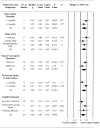Effects of Physical Activity on Poststroke Cognitive Function: A Meta-Analysis of Randomized Controlled Trials
- PMID: 28931620
- PMCID: PMC5784766
- DOI: 10.1161/STROKEAHA.117.017319
Effects of Physical Activity on Poststroke Cognitive Function: A Meta-Analysis of Randomized Controlled Trials
Abstract
Background and purpose: Despite the social, health, and economic burdens associated with cognitive impairment poststroke, there is considerable uncertainty about the types of interventions that might preserve or restore cognitive abilities. The objective of this systematic review and meta-analysis was to evaluate the effects of physical activity (PA) training on cognitive function poststroke and identify intervention and sample characteristics that may moderate treatment effects.
Methods: Randomized controlled trials examining the association between structured PA training and cognitive performance poststroke were identified using electronic databases EMBASE and MEDLINE. Intervention effects were represented by Hedges' g and combined into pooled effect sizes using random- and mixed-effects models. Effect sizes were subjected to moderation analyses using the between-group heterogeneity test.
Results: Fourteen studies met inclusion criteria, representing data from 736 participants. The primary analysis yielded a positive overall effect of PA training on cognitive performance (Hedges' g [95% confidence interval]=0.304 [0.14-0.47]). Mixed-effects analyses demonstrated that combined aerobic and strength training programs generated the largest cognitive gains and that improvements in cognitive performance were achieved even in the chronic stroke phase (mean=2.6 years poststroke). Positive moderate treatment effects were found for attention/processing speed measures (Hedges' g [confidence interval]=0.37 [0.10-0.63]), while the executive function and working memory domains did not reach significance (P>0.05).
Conclusions: We found a significant positive effect of PA training on cognition poststroke with small to moderate treatment effects that are apparent even in the chronic stroke phase. Our findings support the use of PA training as a treatment strategy to promote cognitive recovery in stroke survivors.
Keywords: cognition; exercise; meta-analysis; physical activity; stroke; systematic review.
© 2017 American Heart Association, Inc.
Figures




References
-
- Patel MD, Coshall C, Rudd AG, Wolfe CD. Cognitive Impairment after Stroke: Clinical Determinants and Its Associations with Long-Term Stroke Outcomes. Journal of the American Geriatrics Society. 2002;50:700–706. - PubMed
-
- Jokinen H, Melkas S, Ylikoski R, Pohjasvaara T, Kaste M, Erkinjuntti T, et al. Post-stroke cognitive impairment is common even after successful clinical recovery. European Journal of Neurology. 2015;22:1288–1294. - PubMed
-
- Barker-Collo S, Feigin V, Parag V, Lawes C, Senior H. Auckland stroke outcomes study part 2: Cognition and functional outcomes 5 years poststroke. Neurology. 2010;75:1608–1616. - PubMed
-
- Colcombe S, Kramer AF. Fitness effects on the cognitive function of older adults a meta-analytic study. Psychological science. 2003;14:125–130. - PubMed
-
- Groot C, Hooghiemstra A, Raijmakers P, van Berckel B, Scheltens P, Scherder E, et al. The effect of physical activity on cognitive function in patients with dementia: A meta-analysis of randomized control trials. Ageing research reviews. 2016;25:13–23. - PubMed
Publication types
MeSH terms
Grants and funding
LinkOut - more resources
Full Text Sources
Other Literature Sources
Medical
Miscellaneous

